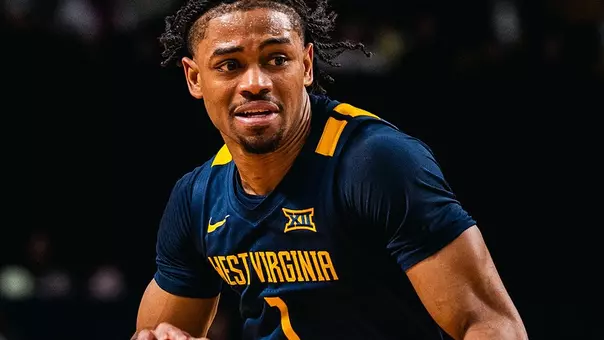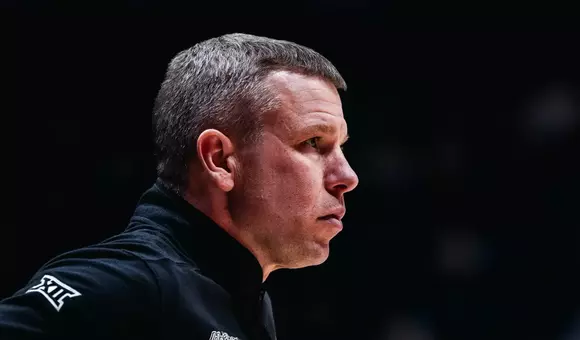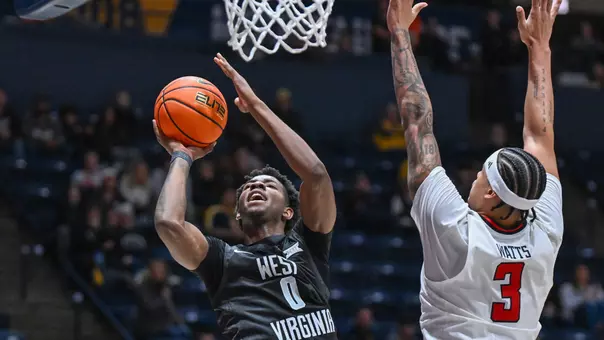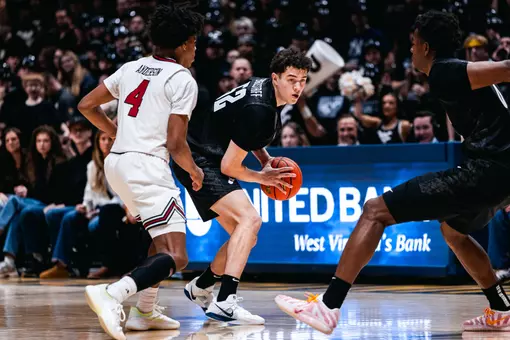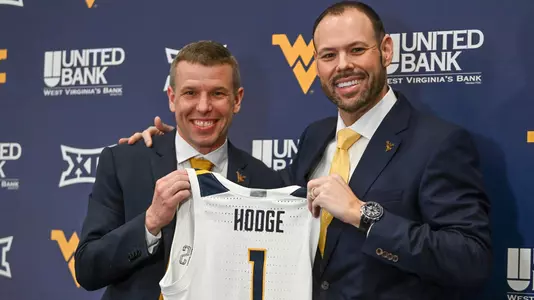
Photo by: All Pro Photography/Dale Sparks
Like Houston, Hodge’s Teams Built On Toughness, Grit and Determination
April 07, 2025 02:20 PM | Men's Basketball
MORGANTOWN, W.Va. – Now I get it.
After having absorbed the final hectic minute of Houston's dramatic, 70-67 come-from-behind victory over Duke last Saturday night, I fully understand why the Cougars were brought up so much during Ross Hodge's introductory press conference as West Virginia University's 24th men's basketball coach last Thursday morning.
Houston was probably mentioned a half-dozen times during his 56-minute visit with media and fans in the Milan Puskar Center team room.
Mostly, the Cougar talk was in relation to where Hodge's North Texas teams were compared to Houston in the national defensive rankings. The last two years, the Cougars have been No. 1 in the country in fewest points allowed per game. Close behind was North Texas.
Two years prior to that, it was North Texas that held the top spot.
Of course, this is old news to Mountaineer fans. They know all about Houston, having watched WVU lose twice to them this year, by 14 in Houston and by 16 in Morgantown. In both games, scoring baskets against the Cougars was like getting a tooth extracted without lidocaine.
I know there are a lot of Ken Pom people out there who enjoy comparing such things as adjusted efficiency margin, adjusted offensive and defensive efficiencies, adjusted tempo, etc., etc.
These are used a lot to help determine which teams are most likely to win college basketball games. Much of this gets shoved down our throats without much context.
Believe it or not, Ken Pom even has a luck rating. What is used to determine this is way beyond my knowledge level.
Montana ended this year No. 1 in this category, followed by Mount St. Mary's, Charleston, UC Riverside and Army.
Seattle was Ken Pom's unluckiest team, followed by The Citadel, Miami (Florida) and Duquesne.
West Virginia, incidentally, finished the season 124th in the luck category, which seems somewhat high considering the shaft job the Mountaineers got this year by the NCAA Tournament Selection Committee.
But I digress.
I tend to view analytics the same way I once approached fourth-period algebra class in high school – with unease and trepidation. High school always seemed much more enjoyable before fourth period, and once again afterward.
So, to watch what Houston did to Duke on Saturday to claw out that victory, live and in living color, really hits home.
The NCAA March Madness social media account posted a time-lapse video with the win probabilities during Houston's amazing comeback.
With 1:14 left and Duke leading 67-61, the Blue Devils had a 91.6%-win probability. After Emanuel Sharp's 3-point basket reduced Duke's lead to 67-64 with 32 seconds left, the Blue Devils still had an 84.7% chance of winning the game.
Then came Duke's botched inbounds pass (or Houston's great defensive work), which led to Joseph Tugler's follow-up dunk with 25.5 seconds remaining to make it a one-point contest.
That reduced Duke's win probability to 65.8%.
Two J'Wan Roberts free throws six seconds later flipped the win probability in Houston's favor when the Cougars took a 68-67 lead. After Cooper Flagg's contested go-ahead jumper came up short, L.J. Cryer added two more free throws and Duke's Hail Mary inbounds pass fell harmlessly to the floor to end the game.
Duke had blown a 14-point second-half lead and a nine-point advantage with 3:03 to go.
Houston's mantra, according to ESPN's Myron Medcalf, was just hang in there.
Don't quit. Keep playing until the clock shows zero.
Just like shooting, passing and dribbling, toughness and competitiveness are basketball skills, too. That was clear watching coach Kelvin Sampson's team on Saturday.
"No one ever loses at anything as long as you don't quit," he explained afterward.
Hodge sort of said something similar last Thursday morning when he took a moment to talk about his mother, Linda.
He said his team's style based on toughness, grit and determination was born out of his mother's life experiences.
"My mom worked three jobs at one point in time," he mentioned, becoming emotional.
She got up at 4:30 each morning to drive a school bus, then worked a full day as a teacher's aide. Afterward, her workday continued at JCPenney in the evening time to make a few extra bucks.
"She had stretches where she worked 20, 21 days in row without taking a day off," he said. "If you watch our team play and you say, 'Man, that's a tough team,' well … that's a tough woman right there."
I'm not aware of any metrics for toughness. Good eyesight is still required to determine that.
Houston's toughness was certainly on display Saturday night - something all Mountaineer basketball fans will come to appreciate.
After having absorbed the final hectic minute of Houston's dramatic, 70-67 come-from-behind victory over Duke last Saturday night, I fully understand why the Cougars were brought up so much during Ross Hodge's introductory press conference as West Virginia University's 24th men's basketball coach last Thursday morning.
Houston was probably mentioned a half-dozen times during his 56-minute visit with media and fans in the Milan Puskar Center team room.
Mostly, the Cougar talk was in relation to where Hodge's North Texas teams were compared to Houston in the national defensive rankings. The last two years, the Cougars have been No. 1 in the country in fewest points allowed per game. Close behind was North Texas.
Two years prior to that, it was North Texas that held the top spot.
Of course, this is old news to Mountaineer fans. They know all about Houston, having watched WVU lose twice to them this year, by 14 in Houston and by 16 in Morgantown. In both games, scoring baskets against the Cougars was like getting a tooth extracted without lidocaine.
I know there are a lot of Ken Pom people out there who enjoy comparing such things as adjusted efficiency margin, adjusted offensive and defensive efficiencies, adjusted tempo, etc., etc.
These are used a lot to help determine which teams are most likely to win college basketball games. Much of this gets shoved down our throats without much context.
Believe it or not, Ken Pom even has a luck rating. What is used to determine this is way beyond my knowledge level.
Montana ended this year No. 1 in this category, followed by Mount St. Mary's, Charleston, UC Riverside and Army.
Seattle was Ken Pom's unluckiest team, followed by The Citadel, Miami (Florida) and Duquesne.
West Virginia, incidentally, finished the season 124th in the luck category, which seems somewhat high considering the shaft job the Mountaineers got this year by the NCAA Tournament Selection Committee.
But I digress.
I tend to view analytics the same way I once approached fourth-period algebra class in high school – with unease and trepidation. High school always seemed much more enjoyable before fourth period, and once again afterward.
So, to watch what Houston did to Duke on Saturday to claw out that victory, live and in living color, really hits home.
The NCAA March Madness social media account posted a time-lapse video with the win probabilities during Houston's amazing comeback.
With 1:14 left and Duke leading 67-61, the Blue Devils had a 91.6%-win probability. After Emanuel Sharp's 3-point basket reduced Duke's lead to 67-64 with 32 seconds left, the Blue Devils still had an 84.7% chance of winning the game.
Then came Duke's botched inbounds pass (or Houston's great defensive work), which led to Joseph Tugler's follow-up dunk with 25.5 seconds remaining to make it a one-point contest.
That reduced Duke's win probability to 65.8%.
Two J'Wan Roberts free throws six seconds later flipped the win probability in Houston's favor when the Cougars took a 68-67 lead. After Cooper Flagg's contested go-ahead jumper came up short, L.J. Cryer added two more free throws and Duke's Hail Mary inbounds pass fell harmlessly to the floor to end the game.
Duke had blown a 14-point second-half lead and a nine-point advantage with 3:03 to go.
Houston's mantra, according to ESPN's Myron Medcalf, was just hang in there.
Don't quit. Keep playing until the clock shows zero.
Just like shooting, passing and dribbling, toughness and competitiveness are basketball skills, too. That was clear watching coach Kelvin Sampson's team on Saturday.
"No one ever loses at anything as long as you don't quit," he explained afterward.
Hodge sort of said something similar last Thursday morning when he took a moment to talk about his mother, Linda.
He said his team's style based on toughness, grit and determination was born out of his mother's life experiences.
"My mom worked three jobs at one point in time," he mentioned, becoming emotional.
She got up at 4:30 each morning to drive a school bus, then worked a full day as a teacher's aide. Afterward, her workday continued at JCPenney in the evening time to make a few extra bucks.
"She had stretches where she worked 20, 21 days in row without taking a day off," he said. "If you watch our team play and you say, 'Man, that's a tough team,' well … that's a tough woman right there."
I'm not aware of any metrics for toughness. Good eyesight is still required to determine that.
Houston's toughness was certainly on display Saturday night - something all Mountaineer basketball fans will come to appreciate.
TV Highlights: WVU 74, UCF 67
Saturday, February 14
Ross Hodge | UCF Postgame
Saturday, February 14
United Bank Playbook: UCF Preview
Friday, February 13
Ross Hodge | UCF Preview
Thursday, February 12
